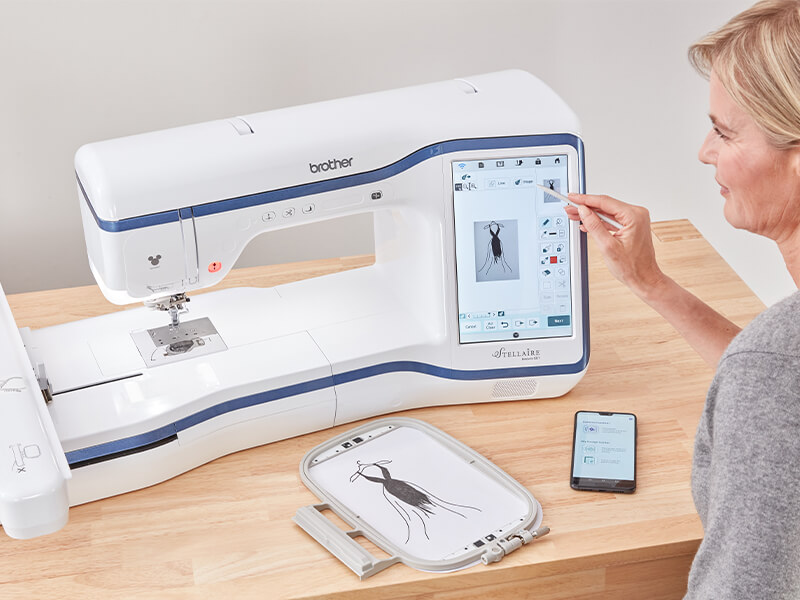Introduction
You just found the perfect image for your next embroidery project—a family photo, company logo, or custom design. There’s just one problem: your Brother machine needs it in VP3 format. Don’t worry, learning how to convert JPG image to VP3 format isn’t as complicated as it seems. With the right approach, you can transform any image into a stitch-ready VP3 file that your Brother machine will love.
This guide breaks down the entire convert JPG image to VP3 process into simple, manageable steps. Whether you’re a beginner making your first embroidery file or an experienced digitizer looking to improve your workflow, you’ll discover the best methods to convert JPG image to VP3 and get professional-quality results. We’ll cover free options, paid software, and everything in between—so you can choose the perfect solution for your needs and budget.This guide breaks down the entire conversion process into simple, manageable steps. Whether you’re a beginner making your first embroidery file or an experienced digitizer looking to improve your workflow, you’ll discover the best methods to get professional-quality results. We’ll cover free options, paid software, and everything in between—so you can choose the perfect solution for your needs and budget.
Why VP3 Files Matter for Brother Machines
Before we dive into conversions, let’s understand what makes VP3 files special:
- Brother’s proprietary format optimized for their machines
- Smaller file sizes than universal formats like DST
- Preserves special features like precise thread trims
- Better stitch accuracy with machine-specific optimization
- Color matching to Brother’s thread system
Choosing the Right JPG for Conversion
Not all images convert equally well. Follow these guidelines when selecting your JPG:
Ideal JPGs Have:
✔ High contrast between subject and background
✔ Clear, distinct outlines and shapes
✔ One dominant focal point
✔ Good lighting without harsh shadows
✔ Resolution of 300dpi or higher
Poor Candidates Include:
✖ Blurry or pixelated images
✖ Photos with busy, cluttered backgrounds
✖ Images with subtle gradients or watercolor effects
✖ Group shots with small faces
✖ Dark images with minimal contrast
Preparing Your JPG for Conversion
Essential Editing Steps:
- Crop tightly around your main subject
- Adjust brightness/contrast to enhance edges
- Convert to black and white to evaluate the composition
- Simplify complex areas (like detailed fur or hair)
- Save as PNG to maintain clean edges before converting
Method 1: Free Online Converters
Best for quick, simple projects when you’re starting out:
Recommended Free Tools:
- MyEditor Online (best for basic designs)
- Online-Convert.com (simple interface)
- EmbroideryDesigns.com (requires free account)
How to Convert Online:
- Upload your prepared JPG
- Select VP3 as the output format
- Choose basic settings (size, colors)
- Download and test your file
Pros:
- No software to install
- Instant results
- Good for testing concepts
Cons:
- Limited control over output
- Quality varies between services
- Watermarks on free versions
Method 2: Brother Software Solutions
Using Brother’s Built-In Software:
Most Brother machines come with basic conversion software:
- PE-Design (various versions)
- Brother Embroidery Software
Conversion Process:
- Import your JPG
- Use the auto-trace function
- Adjust stitch settings
- Save as VP3
- Transfer to your machine
Pros:
- Optimized for Brother machines
- Good for simple to medium designs
- Includes basic editing tools
Cons:
- Limited advanced features
- Some versions are expensive
- Steeper learning curve
Method 3: Professional Digitizing Software
For the highest quality results:
Top Professional Options:
- Hatch Embroidery ($599)
- Wilcom EmbroideryStudio ($3,000+)
- Embrilliance ($299)
Professional Conversion Workflow:
- Clean up JPG in photo editing software
- Import to digitizing program
- Set stitch parameters
- Manual editing of problem areas
- Export as VP3 with optimal settings
Pros:
- Best stitch quality
- Complete creative control
- Handles complex images
Cons:
- Significant investment
- Requires time to learn
- May be overkill for simple projects
Step-by-Step: Converting a Logo to VP3
Let’s walk through a practical example:
- Prepare Your JPG
- Convert to high-contrast black and white
- Simplify any complex elements
- Resize to your target embroidery dimensions
- Auto-Digitizing Basics
- Use software’s trace function
- Set appropriate stitch density
- Choose stitch types (satin for edges, fill for large areas)
- Manual Adjustments
- Clean up jagged edges
- Add registration points
- Optimize stitch direction
- Finalizing the VP3 File
- Check stitch count
- Verify color sequence
- Run stitch simulation
- Save as VP3 and test
Troubleshooting Common VP3 File Issues
Problem: Machine doesn’t recognize file
Solution: Verify correct VP3 version and try re-saving
Problem: Design elements out of alignment
Solution: Check underlay and pull compensation
Problem: Excessive thread breaks
Solution: Reduce stitch density in problem areas
Problem: Colors don’t match original
Solution: Manually set thread palette
Pro Tips for Perfect VP3 Files
- Start with high-quality JPGs (300dpi or higher)
- Limit colors to 6-8 for best results
- Test on scrap fabric before final project
- Save original files before converting
- Learn basic digitizing principles for better manual control
When to Consider Professional Digitizing
Outsourcing makes sense when:
- Working with extremely complex images
- Needing corporate logos with exact specifications
- Requiring rush turnaround times
- Lacking proper software/hardware
The Future of JPG to VP3 Conversions
Exciting developments coming:
- AI-powered auto-digitizing
- Cloud-based conversion services
- Improved mobile apps
- Better auto-tracing algorithms
Conclusion
Converting JPG images to VP3 format unlocks endless creative possibilities for your Brother embroidery machine. While free tools work for simple tests, investing in quality digitizing software pays off through professional results and time savings.
Remember that every expert was once a beginner. Start with simple designs, practice regularly, and don’t be afraid to experiment. Your perfect embroidery project is just a VP3 file away!
Ready to create your first VP3 file? Choose a clear, high-contrast JPG and give it a try today. Your Brother machine is waiting to bring your designs to life in stitches.
